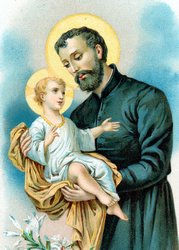Lives of the Saints
Our Models and Protectors
Spiritual Bouquet:
August 7

Saint Cajetan of Thiena
Founder
(1480-1547)
Saint Cajetan was born in 1480 at Vicenza near Venice in Italy, of the pious and noble family by the name of Thiena. His great-uncle, who bore the same name as himself and was a Canon of Padua, was considered to be the prince of the theologians of his century; and several prelates and cardinals, as well as governors of Milan and Naples, were of the same line. His parents dedicated Cajetan to our Blessed Lady. From childhood he was remarked for his obedience, his temperance, and his charity towards the poor.
A distinguished student, a veritable model for all his peers, he desired a higher perfection and left his native town, where he was in honor, to seek obscurity in Rome. There, however, Pope Julius II, perceiving his merit, named him an apostolic protonotary, a high office. He joined a certain Congregation or Confraternity known as that of Divine Love and, working with its members, introduced frequent Communion in their midst, and elsewhere through their influence. The Pope saw to his ordination, and he then offered many fervent Masses. About that time, on Christmas Eve at the Church of Saint Mary Major, when he entered the church he saw the Holy Mother; She came to him and placed Her divine Infant in his arms. It was also Saint Cajetan who later would introduce the Forty Hours' Adoration of the Blessed Sacrament, as an antidote to the heresy of Calvin.
He returned to Vicenza when his mother died, and began to seek out the sick poor and transport them to the Hospital of the Incurables or of Mercy, with which he had united the Congregation of Divine Love, established in that city also. He served the sick in the hospital himself. He placed himself under the direction of a holy Dominican priest, Father John Baptist de Crema, who not long afterwards told him he should go to Venice. His obedience was perfect in this sacrifice, which cost not only himself but those in his hospital many tears. At Venice too, he was needed in a hospital; and the Venetians in those days of luxury and licence, soon reformed what was not correct in their conduct to follow his holy examples.
To renew the lives of the clergy, in 1524, with Paul Caraffa, then Bishop of Theata or Chieti in the kingdom of Naples, who later would become Pope Paul IV, and with two other fervent Christians, Saint Cajetan founded the first group of Regular Clerics, since known as Theatines. All had deeply regretted the state of the Church at that time, and with ardor they devoted themselves to preaching, to the administration of the sacraments and the careful execution of the Church's rites and ceremonies.
When the Germans, under Constable Bourbon, sacked Rome, Saint Cajetan was barbarously scourged to extort from him imaginary riches; his only wealth was his good works, which he had long since securely stored in heaven. When the Saint was on his deathbed, resigned to the Will of God, happy to suffer to satisfy his love, and eager for death to attain to life, he again beheld the Mother of God, radiant with splendor and surrounded by ministering seraphim. Turning Her countenance full of majesty and sweetness upon him, She said, Cajetan, My Son calls you. Let us go in peace. Worn out with toil and sickness, he went to his reward in 1547.
Reflection: Imitate Saint Cajetan's devotion to our Blessed Lady, by invoking Her aid before every work.
Les Petits Bollandistes: Vies des Saints, by Msgr. Paul Guérin (Bloud et Barral: Paris, 1882), Vol. 9; Little Pictorial Lives of the Saints, a compilation based on Butler's Lives of the Saints and other sources by John Gilmary Shea (Benziger Brothers: New York, 1894).